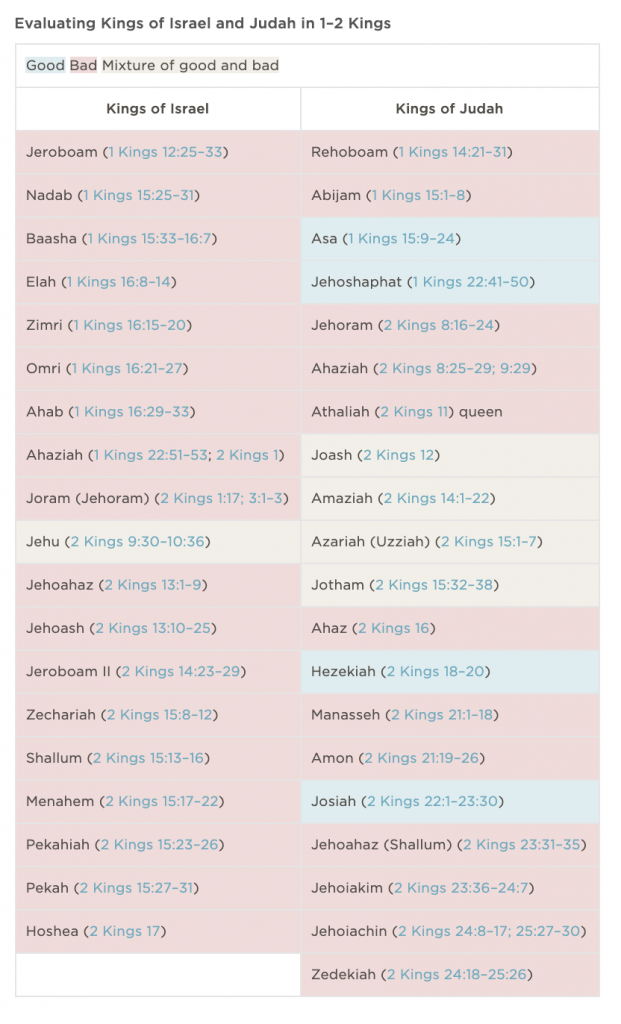
I’ve been processing my notes from our theology cohort in my blog. We are reading God’s Relational Presence by Duvall and Hays. The authors propose that the main thread in scripture is how God relates to His creation and that all other themes connect to this primary idea. As we work through the book, our cohort explores how God’s relational presence is evident in scripture. You can find previous notes on this topic using the drop down box on the right – the category, “Tracing the Biblical Theme – God’s presence.” Today, my focus is on God’s presence in the books of the kings!
The books of the kings open with the elderly David dying, and Adonijah and Solomon vying for the kingship. David ensures that Solomon is crowned king. After establishing his reign, Solomon builds a temple to the Lord. The temple is patterned after the tabernacle, only larger and more beautiful. When it is completed, the presence of God fills the temple!
When the priests withdrew from the Holy Place, the cloud filled the temple of the Lord. And the priests could not perform their service because of the cloud, for the glory of the Lord filled his temple. Then Solomon said, “The Lord has said that he would dwell in a dark cloud; I have indeed built a magnificent temple for you, a place for you to dwell forever.”
1 Kings 8:10-13
After God’s presence fills the temple, Solomon prays. Theologians find Solomon’s prayer particularly interesting because instead of acknowledging God’s immediate, immanent presence, he prays to God in heaven. In fact, the phrase, “hear from heaven” is used 7 times in 1 Kings 8:30, 32, 34, 36, 39, 43, 45. Theologians hypothesize various reasons why Solomon might place God in heaven instead of right within the Temple. I won’t go into all of those details, except to say, the reason most obvious to me is that Solomon’s relationship with God was not as intimate, not as personal as his father, King David’s, had been. And so while it was obvious that God’s glory filled the Temple, it was visible to the people, God was somewhat far off from Solomon personally. (Hey – just one of the hypotheses!)
Of course God did meet with Solomon personally, reaffirming His covenant, saying, “I have consecrated this temple, which you have built, by putting my Name there forever. My eyes and my heart will always be there.” But some 20 plus years later, the story bears out this hypothesis, “So Solomon did evil in the eyes of the Lord; he did not follow the Lord completely, as David his father had done.”
The books of the kings record how Israel and Judah split, and the kings that ruled over them. This chart illustrates that there were very few Godly kings!
Asa did what was right in the eyes of the Lord, as his father David had done. …Although he did not remove the high places, Asa’s heart was fully committed to the Lord all his life. He brought into the temple of the Lord the silver and gold and the articles that he and his father had dedicated.
1 Kings 15:11, 14, 15
Jehoshaphat son of Asa became king of Judah in the fourth year of Ahab king of Israel. … In everything he followed the ways of his father Asa and did not stray from them; he did what was right in the eyes of the Lord. … Jehoshaphat was also at peace with the king of Israel.
1 Kings 22:41 – 44
Hezekiah trusted in the Lord, the God of Israel. There was no one like him among all the kings of Judah, either before him or after him. He held fast to the Lord and did not stop following him; he kept the commands the Lord had given Moses. And the Lord was with him; he was successful in whatever he undertook.
2 Kings 18:5 – 7
[Josiah] did what was right in the eyes of the Lord and followed completely the ways of his father David, not turning aside to the right or to the left.
2 Kings 22:2
Notice these four kings did what was right in the eyes of the Lord, they were committed to the Lord, they followed the ways of their ancestor, King David. These men sought God in the temple, relating personally to God in their midst – not just as one who dwelled high in the heavens.
But the Lord was gracious to them and had compassion and showed concern for them because of his covenant with Abraham, Isaac and Jacob. To this day he has been unwilling to destroy them or banish them from his presence.
2 Kings 13:23
The people of Israel persisted in their sin, their leaders continually leading them away from God, worshipping idols. Finally God says of the Northern Kingdom (Israel), “the Lord was very angry with Israel and removed them from his presence (2 Kings 17:18).” And then of the Southern Kingdom (Judah), “It was because of the Lord’s anger that all this happened to Jerusalem and Judah, and in the end he thrust them from his presence (2 Kings 24:20).” This language reminds me of Adam and Eve being banished from the Garden – “he drove the man out” from His presence!
Kings records this important word from God through Isaiah: “Have you not heard that I determined it long ago? I planned from days of old what now I bring to pass” (2 Kings 19:25). Not only does God have the power to make the utterly unthinkable happen in 24-hour cycles; he also has the patience to watch attentively over his words, and bring them to pass — every single one — in his perfect timing, whether it spans days and weeks, or generations and millennia.
David Mathis, Desiring God
Here we are … a cliffhanger so to speak. We know God’s redemptive plan has not been completed. Where will we see God’s presence again? Will God restore these earthly kingdoms that have been banished into exile? Stay tuned …
